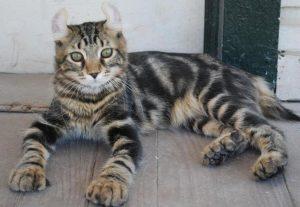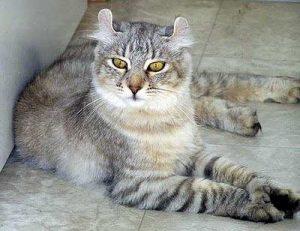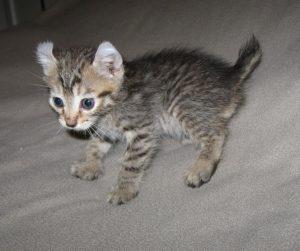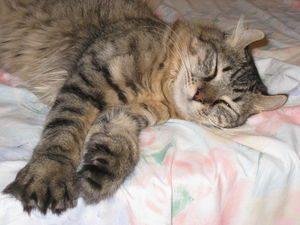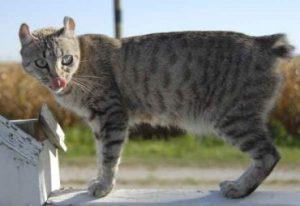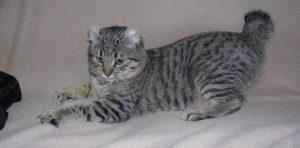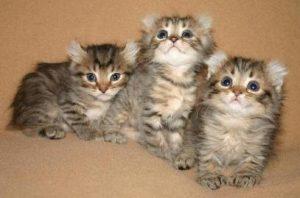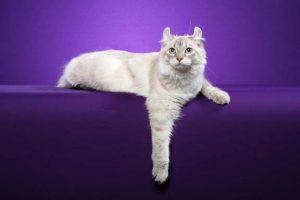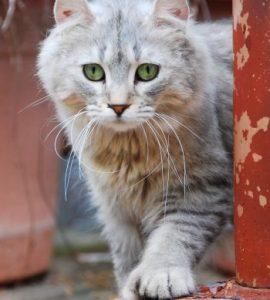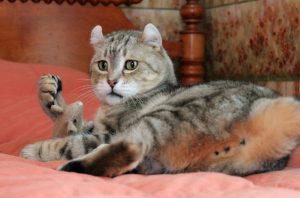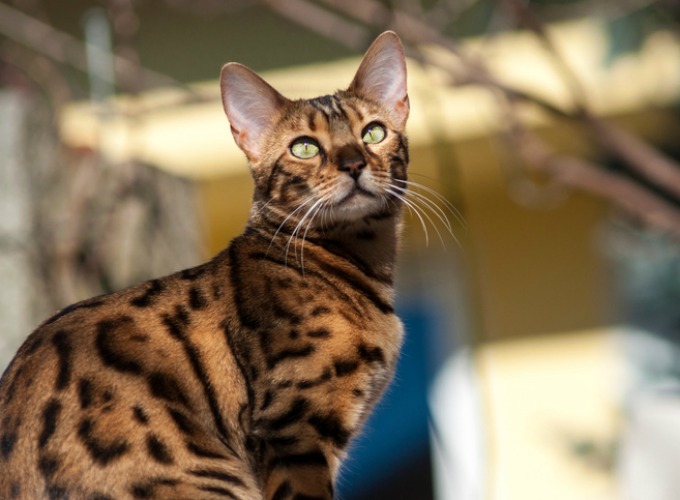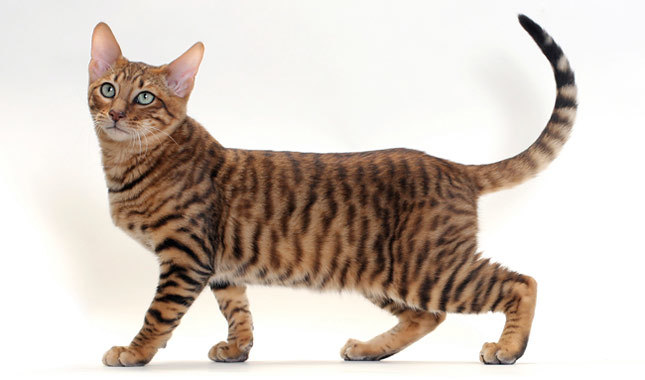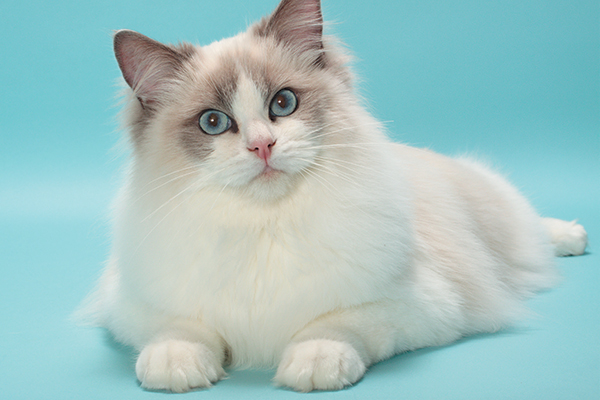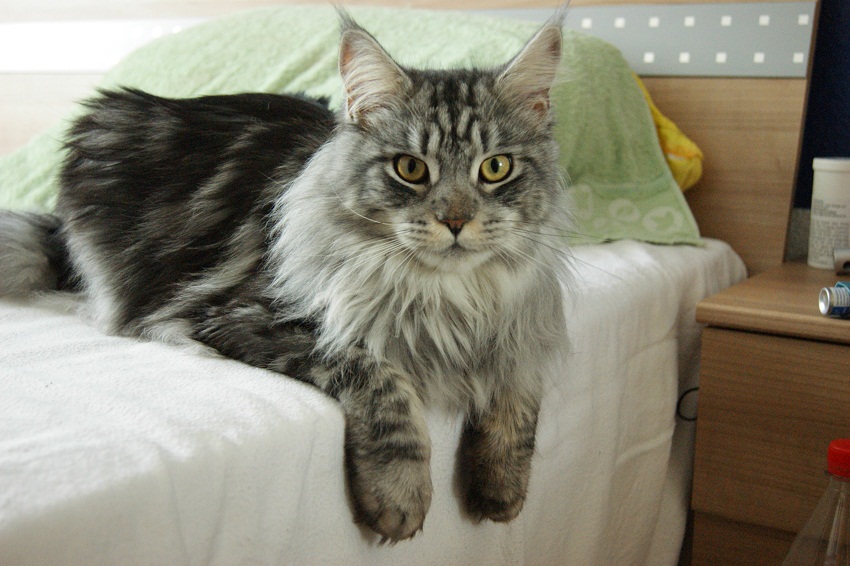The Highlander Cat is a breed of domesticated feline that is known for its large size and lynx-like features. Their inherent playful nature has given them a few characteristics, including a muscular and powerful body. These felines have a broad head, very much resembling an inverted pear. The tip of their ears is usually curled or folded backward, which is their distinctive characteristic. They have a large, stout structure with medium long legs and muscular buttocks, while the paws are big. The tail is kinked or curled, and is stubby, though some specimens are bobbed.
Quick Information
Physical Appearance & Size
| Weight: | 12-25 pounds (male/female average, with females being lighter) |
| Height: | 10-16 inches |
Colors & Patterns
| Body Type: | Large |
| Coat Type: | Soft, short, long |
| Colors/Patterns: | Available in all colors (black, white, red, gray, etc.) with spotted or marbled markings, resembling the bobcat |
| Tail Type: | Thick, fluffy, bushy; 5cm in length (approx.) |
Other Characteristics
| Other Names: | Highlander Shorthair, Highland Lynx |
| Life Expectancy (Lifespan): | 10-15 years (average – 12) |
| Characteristics/Qualities: | Loving, intelligent, social, playful |
| Lap Cat: | No |
| Shedding: | Minimal |
| Good with Children: | Yes |
| Good with Pets: | Yes |
| Vocalization/Noises: | Minimal |
| Hypoallergenic: | Yes |
| Attention Seeker: | Yes |
| Countries of Origin: | USA |
| Availability: | Common |
| Foundation Bloodstock: | Desert Lynx and Jungle Curl |
| Competitive Registration/Qualification Information: | TICA, REFR Breed Standards |
History and Development
It was back in 2004 that the Highlander Cat developed for the very first time. While cthe breed, the breeders did not use cats from any existing breed, but those from the domestic genetic pool.
The primary purpose of the development of the breed was to create a domesticated that that would have the look of the ‘big cat’.
Later, in 2005, it was named as the ‘Highlander’, while the breeders got engaged in working for the championship status of the cat in TICA. They also defined the Highlander breed and its particular characteristics, with their curly ears being one of their distinguishing features.
Finally, the breed got recognition from the TICA for competing in the ‘Preliminary New Breed’ class with effect from 1 May, 2008.
Temperament and Personality
- Very affectionate and gentle by nature. Not much vocal
- Energetic, quite playful and can act funny at times with crazy antics
- Inquisitive and curious, and loves chasing things
- Loves human company and being the center of attention
- Good with children and other pets, including other cats and dogs
Who is the Highlander Cat Good For
- Those who don’t love their cats meowing all day
- Those who are looking for hardy cats with a muscular body (“big cat look”)
- Owners who want to get entertained by their cats
- People who want their pet to socialize with others and be safe for kids
Care
Grooming requirements are minimal since they shed very less. Only brush your cat’s coat occasionally. However, this breed can have both short and semi-long hair, and those having the latter needs a little more attention.
The do not pick up health issues and illnesses quickly and are otherwise healthy. No breed-specific problems reported. But watch out for general cat health issues like hemophilia B, allergies, hypertrophic cardiomyopathy, or obesity, especially if the parents had had such problems.
Are they Easy to Train
Training the Highlander Cats is easy, since they are very intelligent, and have a dog-like disposition. They would also pick up small tricks very quickly, and can be trained to fetch, walk, sit, or accept the leash.
Diet/Feeding
No special dietary schedule, but similar to other large-size, high-energy cat breeds. Stick to high-quality cat foods only, and serve them two meals.
Interesting Facts
- A few individuals of the breed can be polydactyl, which means, they can have as many as seven digits on each or any of their toes (especially, the front paws).
- The zodiac sign of the Highlander Cat is ‘Libra’.

